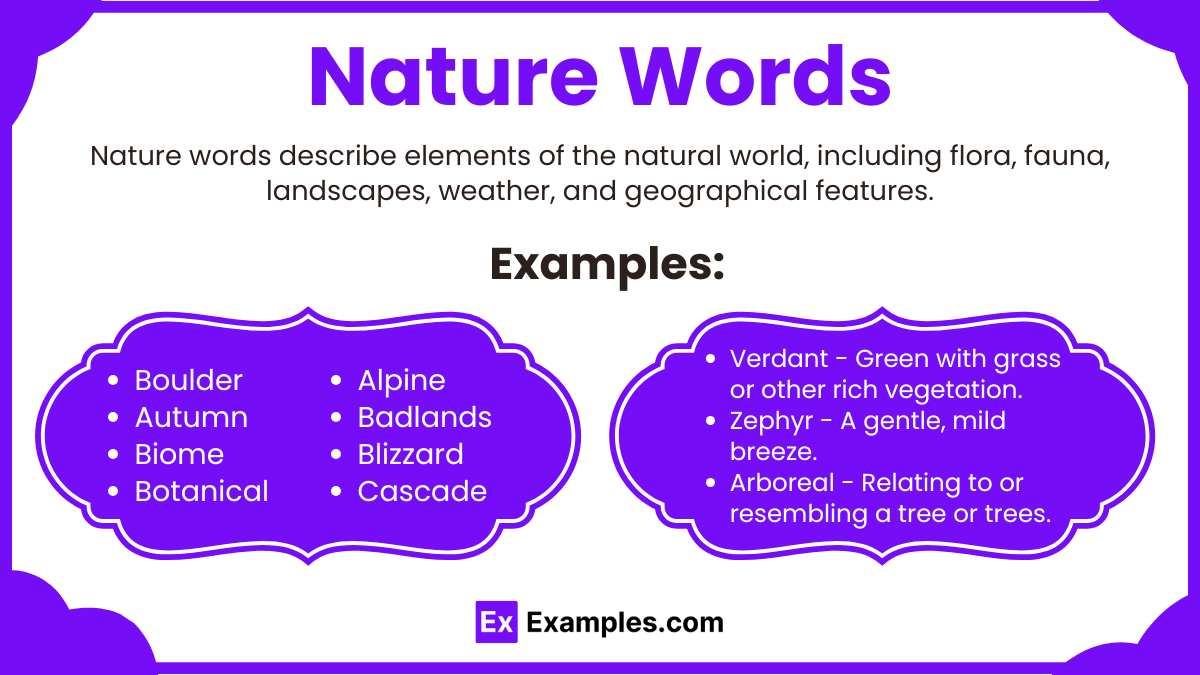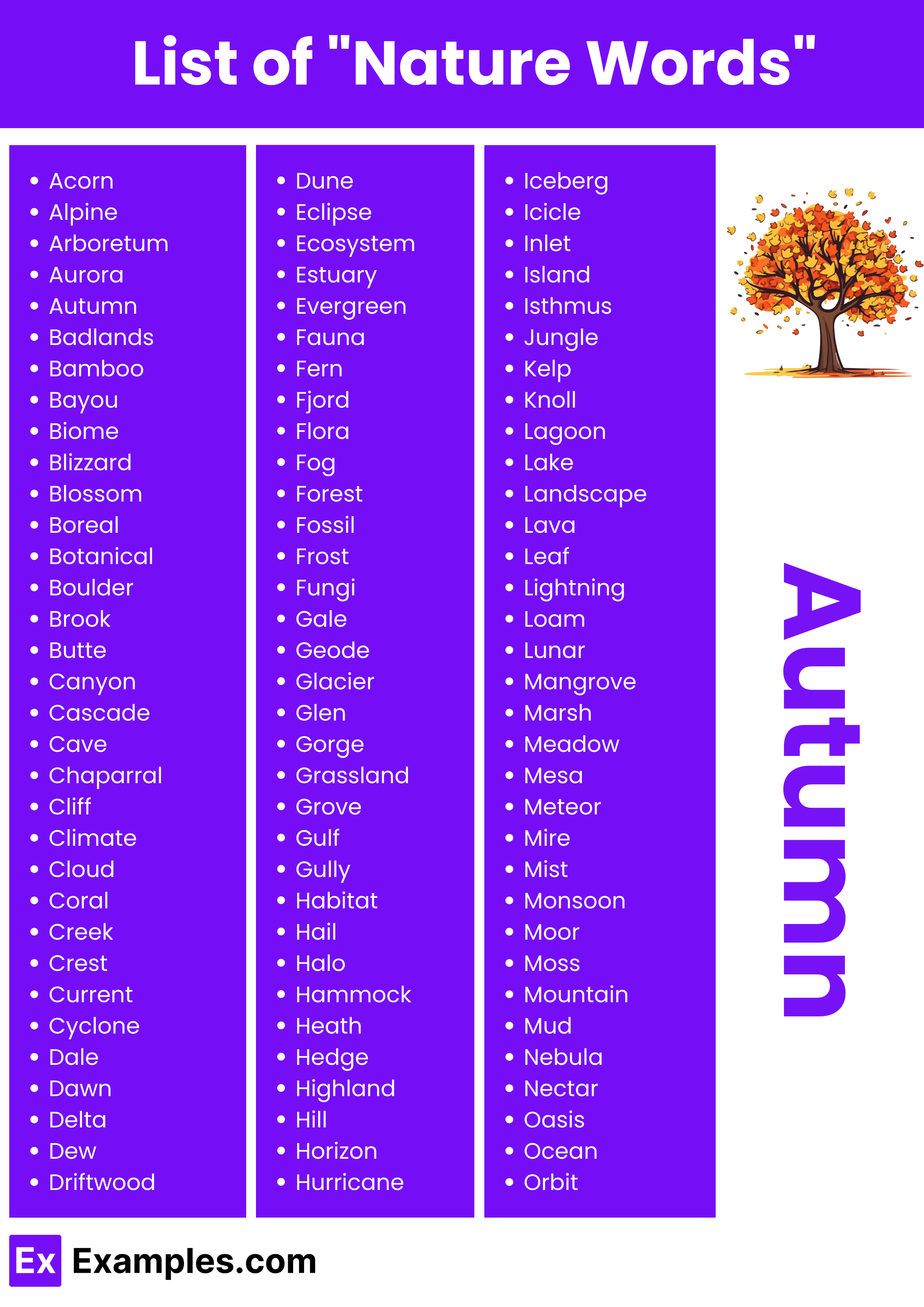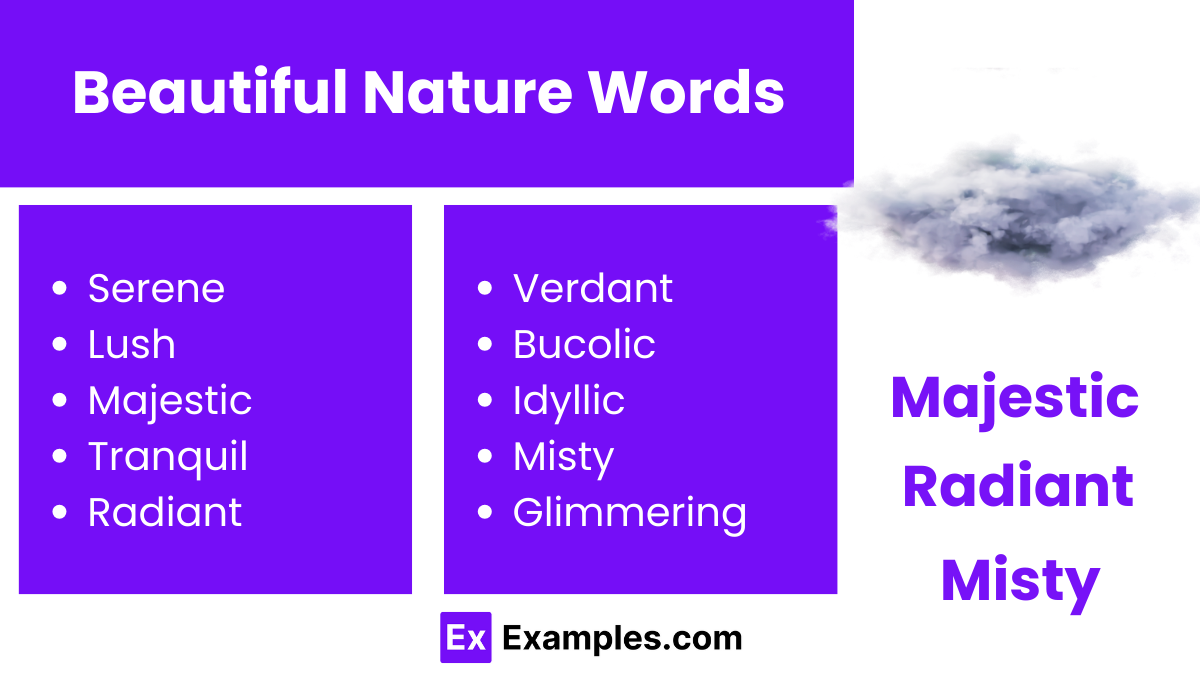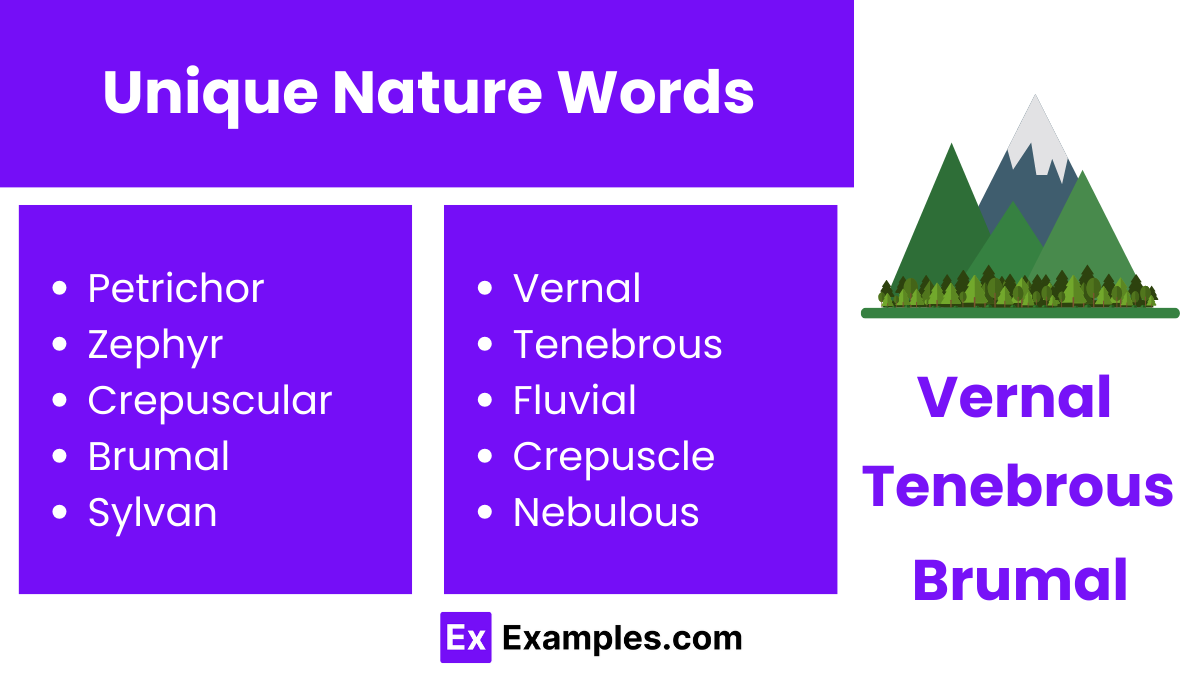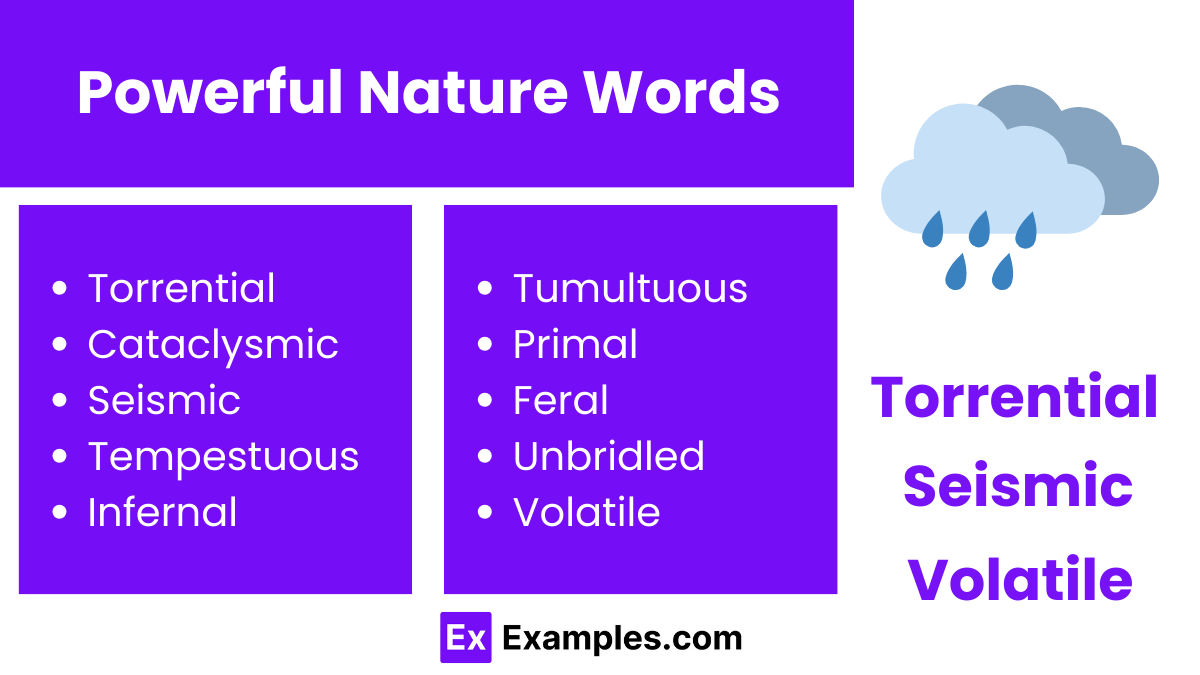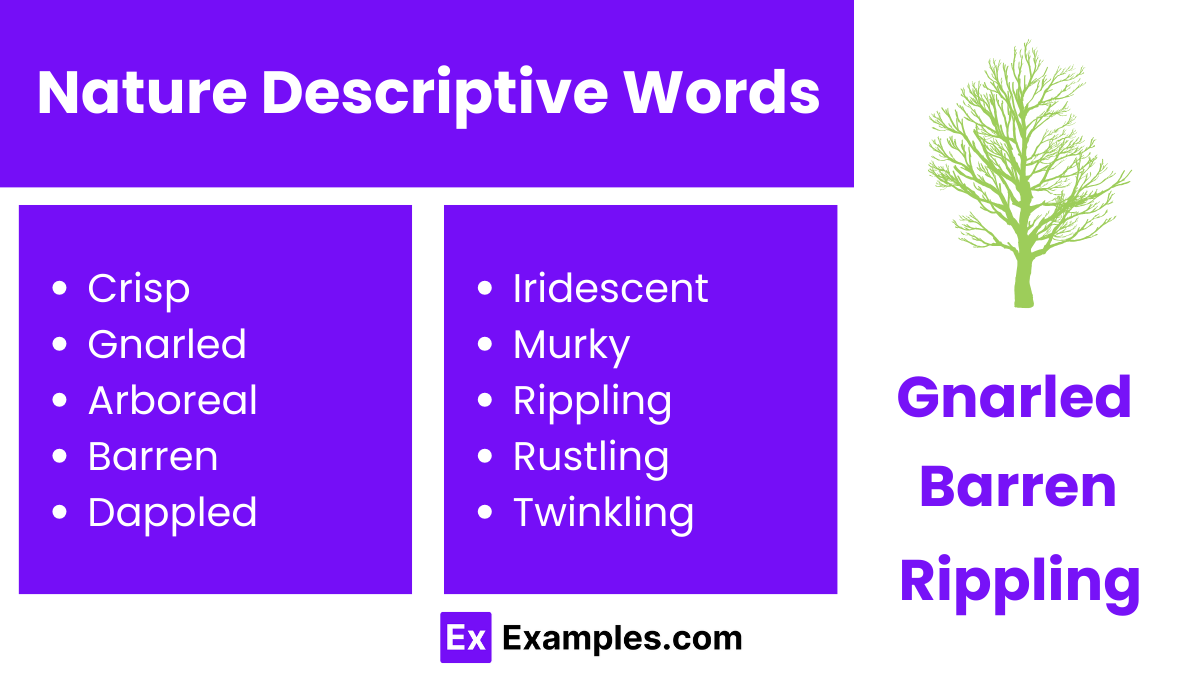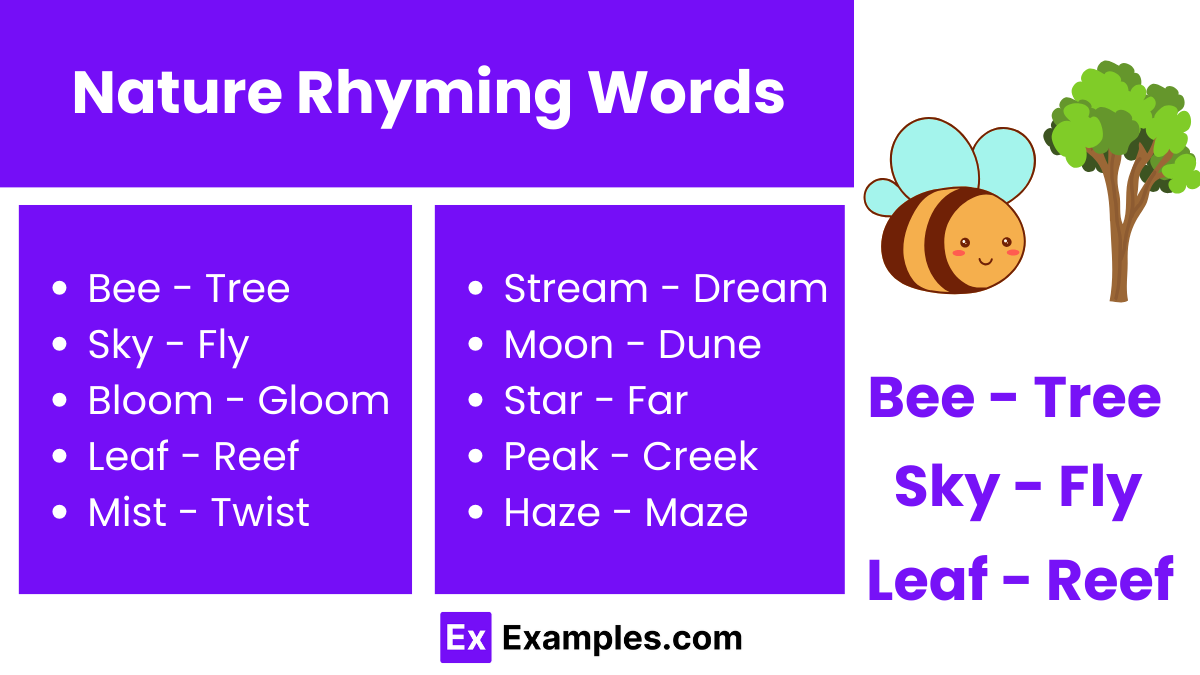450+ Nature Words List, Meaning, PDF
Nature words are the essence of our planet’s beauty, encapsulating the myriad forms, forces, and phenomena that adorn the Earth. From the serene whisper of a gentle stream to the majestic roar of a thunderstorm, these terms paint vivid pictures of the natural world. They allow us to express the profound connection we share with our environment, weaving the tapestry of landscapes, weather, flora, and fauna into our language and storytelling, enriching our communication and creative expression.
Download List of Nature Words - PDF
What are Nature Words?
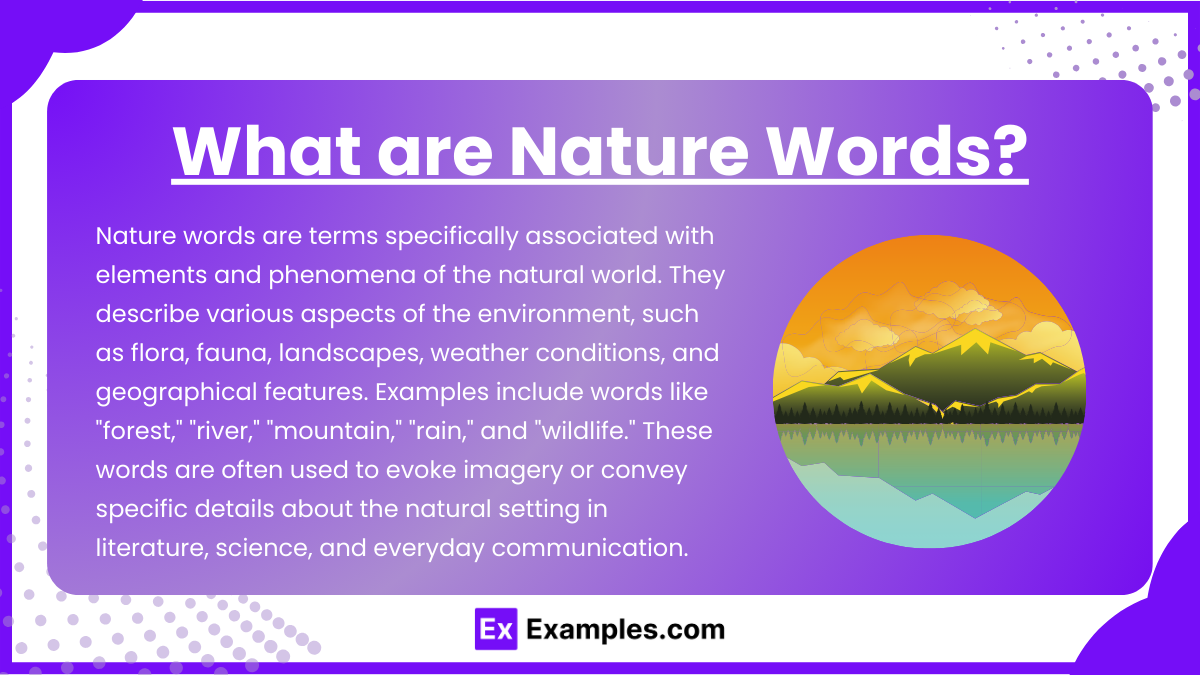
150+ List of “Nature Words”
Nature’s vocabulary is as vast and diverse as the landscapes it describes. From the whisper of leaves in a serene forest to the tumultuous roar of a cascading waterfall, each word in the lexicon of nature brings a piece of the world’s untouched beauty into our spoken and written language. This collection of 300 nature words, organized into a table with four columns, is a testament to the richness of our planet’s ecosystems. It includes terms from various domains such as flora and fauna, geological formations, weather phenomena, and more, each with its unique hue on the palette of natural descriptors.
| Acorn | Alpine | Arboretum | Aurora |
| Autumn | Badlands | Bamboo | Bayou |
| Biome | Blizzard | Blossom | Boreal |
| Botanical | Boulder | Brook | Butte |
| Canyon | Cascade | Cave | Chaparral |
| Cliff | Climate | Cloud | Coral |
| Creek | Crest | Current | Cyclone |
| Dale | Dawn | Delta | Dew |
| Driftwood | Dune | Eclipse | Ecosystem |
| Estuary | Evergreen | Fauna | Fern |
| Fjord | Flora | Fog | Forest |
| Fossil | Frost | Fungi | Gale |
| Geode | Glacier | Glen | Gorge |
| Grassland | Grove | Gulf | Gully |
| Habitat | Hail | Halo | Hammock |
| Heath | Hedge | Highland | Hill |
| Horizon | Hurricane | Iceberg | Icicle |
| Inlet | Island | Isthmus | Jungle |
| Kelp | Knoll | Lagoon | Lake |
| Landscape | Lava | Leaf | Lightning |
| Loam | Lunar | Mangrove | Marsh |
| Meadow | Mesa | Meteor | Mire |
| Mist | Monsoon | Moor | Moss |
| Mountain | Mud | Nebula | Nectar |
| Oasis | Ocean | Orbit | Orchard |
| Ore | Palisade | Palm | Pampas |
| Parkland | Pasture | Peak | Peninsula |
| Petal | Pine | Plain | Plateau |
| Polar | Pollen | Pond | Prairie |
| Precipice | Rain | Rainbow | Rainforest |
| Ravine | Reef | Reservoir | Ridge |
| River | Rock | Root | Safari |
| Sage | Sand | Savanna | Scenery |
| Sea | Season | Sediment | Seed |
| Serengeti | Shore | Sierra | Silva |
| Sky | Slope | Smog | Soil |
| Solar | Sound | Spring | Stone |
| Stream | Summit | Sunbeam | Swamp |
| Taiga | Tarn | Terrain | Thicket |
| Thunder | Tide | Timber | Tornado |
| Tropic | Tundra | Typhoon | Underbrush |
| Valley | Vapor | Vegetation | Veld |
| Vine | Volcano | Vortex | Waterfall |
| Watershed | Wave | Wetland | Whirlpool |
| Wilderness | Wind | Woodland | Zephyr |
Beautiful Nature Words
Immerse yourself in the elegance of the natural world with these beautiful nature words. Each term is a brushstroke that paints the vivid, breathtaking scenes of our planet, from the gentle caress of a breeze to the vibrant hues of a sunset. Ideal for enhancing poetry, prose, or any educational material, these words enrich our descriptions, bringing the splendor of the outdoors into our narratives.
- Serene – Calm and peaceful, like a tranquil lake at dawn.
- Lush – Richly green and vibrant, indicative of healthy vegetation.
- Majestic – Impressively beautiful or grand, like towering mountains.
- Tranquil – Free from disturbance; calm, like a quiet forest.
- Radiant – Emitting or full of light; bright, like the morning sun.
- Verdant – Green with grass or other rich vegetation.
- Bucolic – Relating to the pleasant aspects of the countryside.
- Idyllic – Extremely peaceful or picturesque, embodying perfection in nature.
- Misty – Covered with or characterized by mist, adding a mystical quality.
- Glimmering – Shining faintly with a wavering light, like stars.
Unique Nature Words
Explore the less trodden paths of language with these unique nature words. Perfect for sparking curiosity and enhancing vocabulary, these terms delve into the more nuanced and specialized aspects of our environment. Teachers can use these words to challenge students and encourage a deeper appreciation for both language and nature.
- Petricor – The pleasant, earthy scent produced when rain falls on dry soil.
- Zephyr – A gentle, mild breeze.
- Crepuscular – Relating to twilight or occurring in the twilight hours.
- Brumal – Pertaining to winter or wintry conditions.
- Sylvan – Consisting of or associated with woods; wooded.
- Vernal – Relating to spring; fresh and youthful.
- Tenebrous – Dark and shadowy, especially like a dense forest.
- Fluvial – Pertaining to rivers or river processes.
- Crepuscle – Another term for twilight, the period of dim light before night.
- Nebulous – In the form of a cloud or haze; hazy.
Powerful Nature Words
Harness the dynamic and formidable aspects of nature with these powerful nature words. Ideal for evoking the strength and awe-inspiring elements of the natural world, these terms can be used to discuss environmental phenomena, natural disasters, or the sheer power of Earth’s forces in educational content.
- Torrential – Relating to or resembling a torrent; wild and rushing, as in heavy rain.
- Cataclysmic – Relating to a violent natural event or catastrophe.
- Seismic – Relating to earthquakes or other vibrations of the earth and its crust.
- Tempestuous – Characterized by strong and turbulent or conflicting emotions, like a storm.
- Infernal – Relating to a huge fire or inferno, often used to describe wildfires.
- Tumultuous – Making a loud, confused noise; uproarious, like a tumultuous storm.
- Primal – Essential; fundamental, relating to the early stages of the earth’s history.
- Feral – In a wild state, especially after escape from captivity or domestication.
- Unbridled – Uncontrolled; unconstrained, like an unbridled force of nature.
- Volatile – Liable to change rapidly and unpredictably, especially for the worse, like volcanic activity.
Nature Descriptive Words
Delve into the details of the natural world with these nature descriptive words. Perfect for creating vivid, immersive descriptions, these words help paint a more complete picture of environments, weather, and landscapes. Teachers can use these to enhance students’ descriptive writing skills and deepen their understanding of the natural world’s complexities.
- Crisp – Firm, fresh, and invigorating, often used to describe cool, fresh air.
- Gnarled – Knobbly, rough, and twisted, especially with age, like an old tree.
- Arboreal – Relating to or resembling a tree or trees.
- Barren – Too poor to produce much or any vegetation.
- Dappled – Marked with spots or rounded patches of color or light.
- Iridescent – Showing luminous colors that seem to change when seen from different angles.
- Murky – Dark and gloomy, especially due to thick mist.
- Rippling – Forming or flowing with small waves on the surface, like water.
- Rustling – A soft, muffled crackling sound like that made by the movement of dry leaves or paper.
- Twinkling – Shining with a gleam that changes from bright to faint.
Nature Rhyming Words
Enhance your poetic flair and creative writing with our selection of nature rhyming words. These pairs not only complement each other in sound but also bring the essence of the outdoors into your compositions. Perfect for educational activities, these rhymes can help students learn about nature while improving their linguistic skills and appreciation for poetry and rhyme schemes.
- Bee – Tree: The buzzing insect and the sturdy plant.
- Sky – Fly: The vast expanse above us and the action of soaring.
- Bloom – Gloom: A flower’s opening contrasted with darkness.
- Leaf – Reef: Nature’s foliage and underwater ecosystems.
- Mist – Twist: Water droplets in the air and winding shapes or movements.
- Stream – Dream: Flowing water and a sequence of thoughts.
- Moon – Dune: The night’s luminary and sandy hills.
- Star – Far: Celestial bodies and a great distance.
- Peak – Creek: Mountain tops and small streams.
- Haze – Maze: Diffused light or atmosphere and complex networks.
Perspectives Nature Words
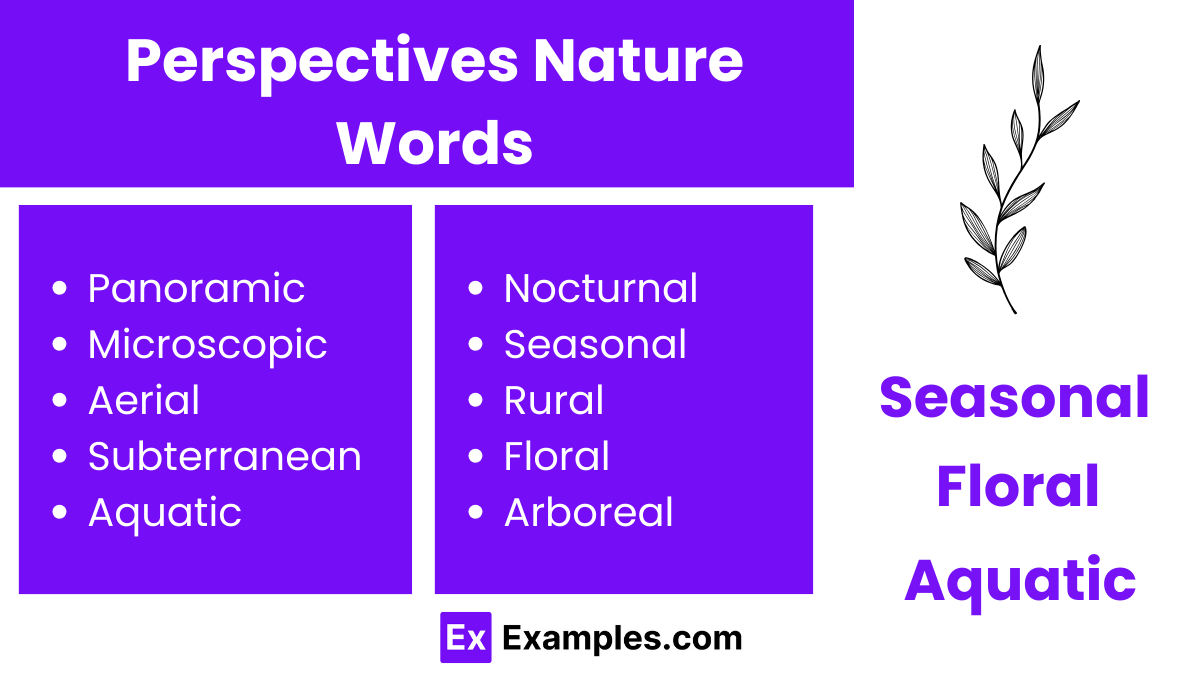
Explore the myriad ways we perceive and interact with nature through these perspectives nature words. Each term offers a unique lens through which to view and describe the natural world, fostering a deeper understanding and appreciation among students. Use these words to enrich discussions, writings, and lessons about environmental awareness, conservation, and the beauty of our planet.
- Panoramic – A wide and unobstructed view of an extensive area.
- Microscopic – Extremely small details, often unseen by the naked eye.
- Aerial – Seen from above, offering a bird’s-eye view of landscapes.
- Subterranean – Existing or occurring below the earth’s surface.
- Aquatic – Pertaining to water, highlighting life and environments in aquatic settings.
- Nocturnal – Related to the night, exploring the world after dark.
- Seasonal – Reflecting the changing seasons and their impact on nature.
- Rural – Emphasizing the characteristics of countryside over urban areas.
- Floral – Focused on flowers and their myriad forms and colors.
- Arboreal – Related to trees, examining life and ecosystems in the forest canopy.
FAQs
Why are nature words important in language?
Nature words help articulate specific details about the environment and enhance sensory descriptions in communication and literature.
Can nature words vary by region?
Yes, nature words often vary regionally, reflecting the local environment and cultural context, such as “tundra” in arctic areas or “savanna” in tropical regions.
How do nature words influence poetry?
In poetry, nature words are crucial for creating vivid imagery and emotional resonance, connecting the reader with the natural world.
Are there educational benefits to learning nature words?
Learning nature words can enhance vocabulary, foster environmental awareness, and encourage exploration and appreciation of nature.
How can teachers incorporate nature words in lessons?
Teachers can integrate nature words into lessons through outdoor activities, environmental studies, and creative writing assignments focused on nature.



